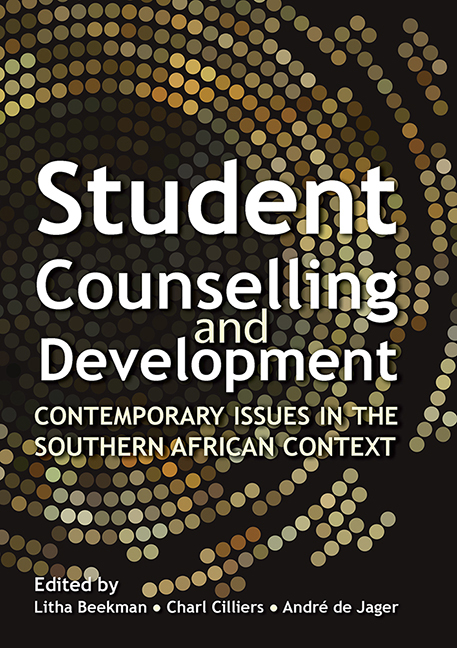Book contents
- Frontmatter
- Contents
- Figures
- Tables
- Preface
- Section 1 Development of Student Counselling and Development in Southern Africa
- Section 2 Theoretical Foundations of Student Counselling and Development in Higher Education
- Section 3 Services and Programmes Provided by Student Counselling and Development Units
- Section 4 Student Counselling and Development For Special Groups
- Section 5 Quality Assurance and Ethical and Professional Issues
- Contributors
- Index
Chapter 12 - Peer Help Programmes At South African Higher Education Institutions
Published online by Cambridge University Press: 22 February 2020
- Frontmatter
- Contents
- Figures
- Tables
- Preface
- Section 1 Development of Student Counselling and Development in Southern Africa
- Section 2 Theoretical Foundations of Student Counselling and Development in Higher Education
- Section 3 Services and Programmes Provided by Student Counselling and Development Units
- Section 4 Student Counselling and Development For Special Groups
- Section 5 Quality Assurance and Ethical and Professional Issues
- Contributors
- Index
Summary
INTRODUCTION
This chapter explores the concept of peer helping within the context of existing student development theory. It indicates how peer helping fits the notion of an integrated model of student development and how it accounts for holistic personal development on a micro and macro-level of social adjustment to the institutional environment. It describes the rationale and practice of peer helping, a support system that utilises trained non-professionals to extend support to other students through empathy and decisionmaking. The specific application of peer helping in the higher education (HE) setting is discussed in detail, with particular attention being given to the involvement of trained, supervised peer helpers in a programme rooted in student counselling.
Students are often approached to support fellow-students or friends who wish to talk to “their own kind”, to express concerns, to share something important, or to ask for assistance. All that is often required is a listening ear, a single act of kindness, or a silent understanding of their situation. At other times the request for assistance may be for more than just to be listened to, for example, if an important decision needs to be made or an important step needs to be taken. When this happens someone is needed who would be willing to walk the road with them, to talk them through their difficulties and to provide moral support. It is in times like these, when the agenda has shifted to an area where more than basic friendship is being asked, that students may find themselves wondering how they might be of assistance. Students may feel puzzled, unskilled and overwhelmed, or they may feel that they have failed, since their assistance seemed to have been ineffective or not accepted in the first place.
In his discussion of this phenomenon, Carr (1981) refers to the well-documented fact that only a minority of students consult professional counselling services when experiencing personal or other concerns. Most students rely primarily on their friends as sources of help. He argues that, with only minor changes in percentages, these findings hold true regardless of age level, quality of counselling available, or experience in working with a counsellor. He notes that especially teenagers and young adults have been virtually ignored for a long time as a source of positive help to their peers.
- Type
- Chapter
- Information
- Student Counselling and DevelopmentContemporary issuesin the Southern African Context, pp. 225 - 244Publisher: University of South AfricaPrint publication year: 2012



